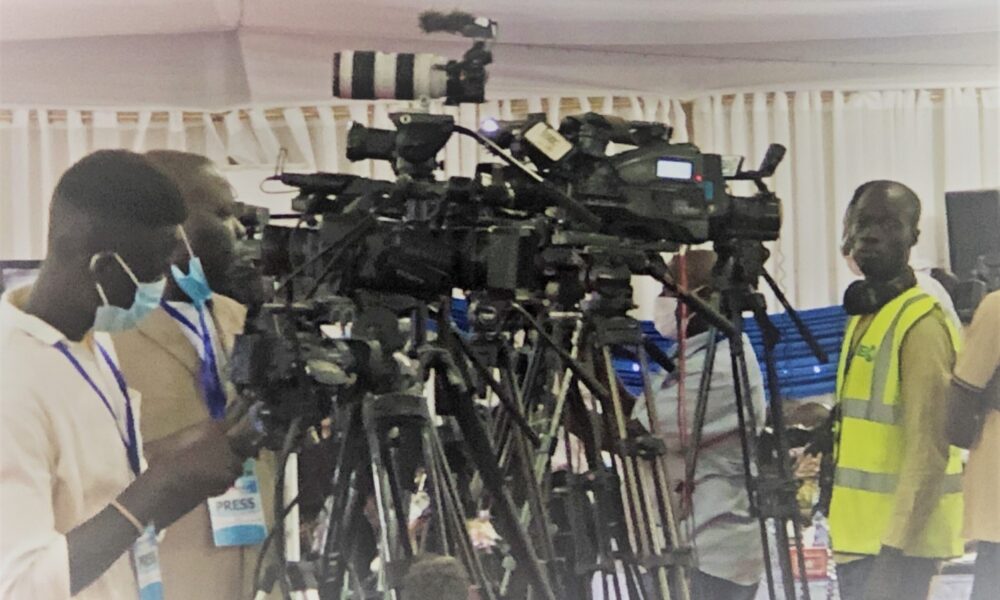By Charles K Mark
Journalists and media stakeholders have voiced deep concerns regarding the shrinking press freedom in the country.
As South Sudan joins the world in celebrating World Press Freedom Day, analysts and rights defenders have highlighted a troubling trend of diminishing media freedom in South Sudan.
The country’s media landscape is experiencing a contraction, posing significant challenges for journalists and impeding the free flow of information.
Press freedom plays a critical role in upholding democratic values, ensuring transparency, and facilitating the exchange of diverse perspectives.
It is also essential for holding those in power to account, promoting public discourse, and nurturing an informed citizenry.
However, the current situation in South Sudan raises alarming concerns about the ability of journalists to carry out their vital work without undue interference or intimidation.
Media stakeholders have identified various obstacles that contribute to the shrinking media landscape.
These include restrictions on freedom of expression, limited access to information, acts of violence and harassment against journalists, arbitrary arrests, and censorship.
Such challenges hinder the ability of journalists to report objectively and independently.
Speaking to this outlet on the eve of World Press Freedom Day, Denis Logonyi, a freelance journalist reporting for Voice of America (VoA) South Sudan in Focus program, highlighted some of the challenges faced by journalists while carrying out their duties.
He said media practitioners have not been given opportunities to experiment with various beats; hence, the scope of media coverage remains inadequate.
According to Logonyi, persuasive mechanisms need to be devised in order to attract more journalists to venture into other fields such as science and environmental journalism.
“It’s imperative that the government and institutions that deal with the environment work in collegiality to bring forward environmental issues affecting South Sudanese,” Logonyi urged.
He, however, applauded fellow journalists who have gone beyond norms to investigate issues of national concern, such as the impact of science on human and environmental development.
Mr. Logonyi also appreciated journalists who sacrificed their lives by going to hard-to-reach areas across the country and digging out and reporting on such hard topics.
He emphasized the need to promote science journalism and prioritize the capacity building of some reporters in order to enhance knowledge and perceptions of diversified science or technology.
On the side of advocacy, ‘nothing is close to press freedom if indeed journalists are far from independently accessing, retrieving, verifying, and disseminating, especially public information.
For his part, Patrick Oyet, the president of the Union of Journalists of South Sudan (UJOSS) stated that there is no press freedom if security apparatuses are awarded the freedom to arrest people who express themselves.
“Freedom of the press is not only for journalists. As journalists, we speak to people. But if people fear to speak, then we have no access to information,” he stated.
“So even if you tell us that we are free, if we can’t access information, then there is no freedom.”
Mr. Oyet called on the government to put an end to media censorship and open up civic space for people to freely express themselves.
“We remind the government to provide real freedom, abandon the removal of articles from newspapers, open up media houses that have been closed down arbitrarily, and encourage citizens to speak and avoid arresting people arbitrarily because they have spoken,” he advocated.
The main objective of World Press Freedom Day is to promote press freedom and defend the media from attacks on their independence.
It also serves as a reminder to governments of their duty to respect and uphold the right to freedom of expression, as enshrined in Article 19 of the Universal Declaration of Human Rights.
Some stakeholders and foreign missions, like the United States of America Embassy, urged the transitional unity government to safeguard civic and political space.
In a statement issued yesterday, the US Embassy in Juba urged the R-TGoNU to defend the rights of journalists to bravely pursue the truth.
“A free and independent press is fundamental to a free society and essential to transparent and good governance,” the statement partly read.
The US Embassy reiterated that defending the free press means granting journalists access to information and protecting journalists from retaliation, harassment, and unlawful detention.
The US gov’t has also renewed its call for the South Sudan government to investigate the American-British freelance journalist who was killed while covering clashes between government forces and SPLA-IO rebels in 2017.
“We take this opportunity to call again for a credible and comprehensive investigation that leads to accountability for the 2017 death of Christopher Allen.”




